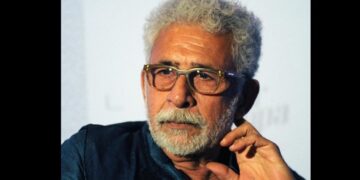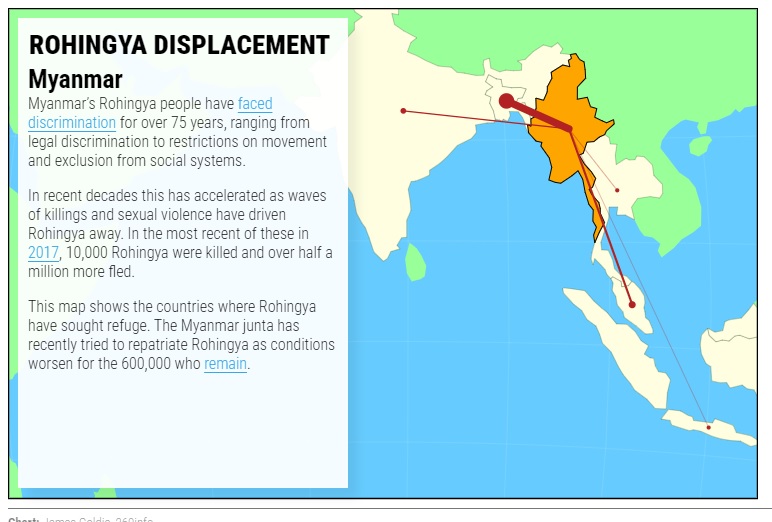By Sabyasachi Basu Ray Choudhury
The stateless Rohingya community with no rights remains the world’s most vulnerable and at high risk of exploitation.
Imagine you are a child without a nation. From the moment you were born, you are a non-person, rendered powerless and condemned to a life in legal limbo. With no rights, no protections, possibly no home and no way to escape.
For millions of Rohingya, this is their reality.
The Burma Citizenship Act of 1982 rendered every Rohingya child born in Myanmar (formerly Burma) as a non-person in the country of their birth.
The Rohingya, a mostly Muslim minority community in predominantly Buddhist Myanmar, are possibly the worst victims of post-colonial nation building.
More than one million stateless Rohingya in Myanmar are in a state of “rightlessness”. The UN has described them as one of the world’s most persecuted minority populations.
In her report to the Human Rights Council in 2018, UN Special Rapporteur on Racism, Tendayi Achiume, underscored the plight of millions of stateless people with no documentation.
Their predicament is often the result of long-standing discrimination against people considered of foreign origin, even though they have been in their respective countries for generations, and sometimes even for centuries.
Also Read: Rohingya conundrum: Stateless, helpless and unwanted
As in other post-colonial countries, in Myanmar too, the process of ‘nation-building’ has shifted from jus soli (citizenship by birth) to jus sanguinis (citizenship by parentage and ancestry). Myanmar’s Citizenship Act of 1982 was based on the principle of citizenship by parentage and ancestry.
This shift was disastrous for the Rohingya because very few of them could fulfil the ancestry requirements. More than 1.5 million Rohingya, mostly Muslim (though a miniscule minority belong to the Hindu community) have been living in the Arakan region bordering Bangladesh, for centuries. Now known as the Rakhine State, it is one of the poorest states of Myanmar.
Historically, the Rohingya are believed to belong to a community that developed from several ethnic groups including Burmese, Arabs, Moors, Persians and Bengalis among others. Although the name Rohingya seems to have come into use only recently. These inhabitants of Arakan have a long history since the beginning of the Mrauk U dynasty (1430–1785).
The confrontation between the Muslims resident in the north-western part of Arakan and the predominantly Buddhist population of central and southern Arakan, has long been tense because of large-scale immigration from India encouraged by British colonialism.
However, the Muslim population of the Arakan predates the arrival of the ethnic Rakhine and not all Rohingya can be termed ‘Bengali’, suggesting migrants from Bangladesh.
Under the Burma Citizenship Act of 1982, three categories of citizens were created: national, associate and naturalised.
Full citizenship in Burma was reserved only for national ethnic groups, or those who could prove their ancestors resided in Burma before the first Anglo-Burmese war.
Under this Act, the Rohingya were reduced to statelessness.
They were treated as “resident foreigners.” Those with National Registration Cards (issued under the post-independence 1949 Residents under the Myanmar Registration Act were required to surrender them.
With that they lost their chance to claim citizenship.
Those few, who were able to obtain naturalized citizenship—one of the three categories of citizenship outlined by the 1982 law—were labelled ‘Bengali’.
Subsequently, between 1995 and 2015, many Rohingya were issued Temporary Registration Cards underlining that they were not citizens and reinforcing their status as “foreigners”.
These cards, which were white in colour (as opposed to blue, green, and pink cards given to citizens) sometimes also classified the Rohingya as ‘Bengali’.
These cards were cancelled in 2015, preventing the Rohingya from voting in national elections and requiring them to go through a new round of documentation and vetting processes. New National Verification Cards (NVC) were issued to all individuals, mostly Rohingya, who were not recognised as citizens.
The Burma Citizenship Act 1982 has been internationally condemned. However, it remains on the statutes, making the Rohingya vulnerable to discrimination and persecution.
Once the bond between the individual and a modern state was broken for the Rohingya, their statelessness affected every aspect of their life and opened them to exploitation.
Travel restrictions greatly impeded doing business and pursuing higher education. They faced frequent demolition of their homes, confiscation of property and the closure of mosques and religious schools. Even grooms with beards had to be clean-shaven before they could marry.
Statelessness especially affects women and children. Rohingya women and girls were raped and attacked without any recourse to justice.
Every Rohingya child born after the introduction the Citizenship Act of 1982, was automatically stateless.
Since 2012, countless Rohingya children have died in the camps for the internally displaced from malnutrition and diseases because of the blockade against aid groups by the government and militant groups.
The Citizenship Act of 1982 was the culmination of a process of discrimination against the Rohingya that had begun much earlier.
After General Ne Win seized power in a military coup in 1962, under the 1974 Constitution, Arakan, which had no provincial autonomy until then, was granted statehood and renamed the Rakhine State. A long-term policy of exclusion of Muslims from the culture and people from the Rakhine State was perhaps initiated thereafter.
In 1978 began a military operation along with a census operation called Nagamin or Operation Dragon King in the mountains north of the Arakan, to check the identity papers of the inhabitants. It became controversial amidst widespread reports of army brutality including rape, murder and the destruction of mosques.
As a consequence, about 200,000 Muslims fled to Bangladesh. The military junta claimed that those who fled in 1978 were, in fact, illegal Bengali immigrants who had entered Burma in colonial times.
The fact is that, many displaced persons had either never had national registration cards, or they had been confiscated by the state authorities during the 1978 operation.
Since the late 1970s, continued persecution at home, have led the Rohingya to continue fleeing to neighbouring Bangladesh.
However, a mass exodus (more than 730,000) of Rohingya refugees to Bangladesh occurred after the 25 August 2017 brutal massacre of the men, women and children of the community.
Despite the ruling of International Court of Justice on the Rohingya genocide issue, the world has largely remained a silent spectator. .
As stateless people, the Rohingya endlessly struggle to access social services, healthcare, education, free movement, and political participation.
And, they remain the world’s most vulnerable being at high risk for exploitation, arbitrary detention, and expulsion.
Given the 2021 military coup in Myanmar, and the subsequent developments, there seems no prospect of their return to their homeland in the foreseeable future.
Sabyasachi Basu Ray Chaudhury is Professor at the Department of Political Science, Rabindra Bharati University, Kolkata, and member, Mahanirban Calcutta Research Group.
This article is part of a Special Report on the Rohingya refugees produced in collaboration with the Calcutta Research Group and the Asian Broadcasting Union.
Originally published under Creative Commons by 360info™.















